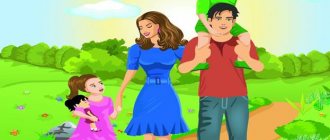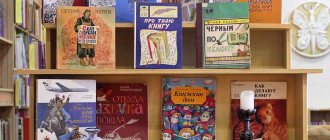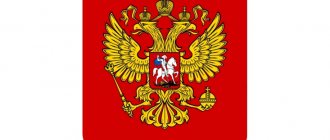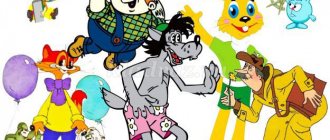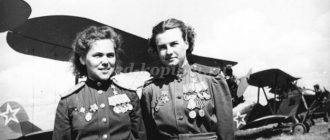International Mother Language Day in the senior group
Entertainment scenario “International Language Day” for children of senior and preparatory groups
Description: The entertainment is aimed at introducing children to the “International Language Day” holiday. This scenario will be useful for educators and music directors in preparing for GCD and entertainment. Goal: To introduce children to the “International Mother Language Day”. Develop curiosity, desire for new knowledge and native language. Objectives: - consolidate children’s knowledge about the culture and language of the Russian, Khakass and English people.
To promote increased interest in the native language, the sound of words in the languages of different nationalities. — to instill in children pride in their native language, for their people and a tolerant attitude towards representatives of other nationalities, their language and culture. Progress of the entertainment:
Children enter the hall to the music and sit on chairs.
Host: Hello guys, and dear guests. When we use the words “friends” in our speech, our speech becomes accurate, bright, expressive, and interesting. What helps us communicate? (language). Today is February 21st every year, the country celebrates International Mother Language Day. There are many languages on the globe. Even when you were just born and were very small, your mothers sang lullabies to you in your native language. How do you understand what your native language is? (which we speak). What language do we speak? (in Russian) Host: What republic do we live in? What nationalities live in our republic? Each nation has a unique culture, history, traditions and, of course, language. Today at our holiday we will learn about representatives of different nations. To the music, a teacher in Russian costume enters the hall: Hello! Our Russian language is rich and beautiful! There are so many words in it, this is the native language of Pushkin, Tolstoy, Gogol, whose fairy tales we often read. Love your Motherland, your language, your people! Children: On the day of your native language, I wish you to preserve it. So that the speech is easy, Swear words without repeating, Speak well - A kind word is pleasant! This is why the language came, so that we can communicate clearly in it. Host: Name proverbs and sayings that talk about language. Children: - The tongue is sharper than a razor. - Language will take you to Kyiv. - A tongue without bones, it babbles whatever it wants. - My tongue is my enemy. - Don’t rush with your language, hurry with your actions. - Listen more and talk less. Guest from Russia: Now let's play. Russian folk game "Zarya" Children stand in a circle, hold their hands behind their backs, and one of the players - Zarya - walks behind with a ribbon and says: Zarya - lightning, Red maiden, Walked across the field, Dropped the keys, Golden keys, Blue ribbons, Rings entwined - She went for water. With the last words, the driver carefully places the ribbon on the shoulder of one of the players, who, noticing this, quickly takes the ribbon, and they both run in different directions in a circle. The one who is left without a place becomes Dawn. The game repeats itself. Host: Guys, the Russian people have a lot of not only games, but also songs. Now we will perform the round dance “Like on thin ice”
Song - round dance “Like a thin summer” - preparatory group (piano) Presenter: Of course, many people of different nationalities live in Khakassia (Russians, Khakassians, Ukrainians and Belarusians) A guest from Khakassia (teacher) enters the hall accompanied by music . words in the Khakass language.
Guys, let’s play with you
the Khakass folk game “Bear and Stump” - senior group:
The driver and the “bear” are selected, the rest are “stumps”. They sit in a circle facing the center of the circle, leaving passages between them. The driver moves between the stumps, lightly touching the tops of the heads while singing the song: “Chubs, chabs, bear, stump.” A bear sneaks up next to catch and stain him. If he catches them, they will both become stumps and sit down, and others will be chosen instead. And everything starts all over again. Guest from Russia: Every nation has its own traditions, culture and language. All this distinguishes each nation from each other. This is what makes people proud of belonging to a particular nation. And the language conveys all the features of the people’s way of life. Therefore, many of them, even small ones, try with all their might to preserve their language, paying tribute to their ancestors and their uniqueness. Presenter: In our kindergarten we educate children of different nationalities. We hope that everyone’s native language is dear and interesting. The same word sounds different in different languages. Guest from Russia: In Russia, Russian is the language of interethnic communication. But there is also a language of international communication - English. In any country in the world they study and know English, wherever you go on a trip, English is your main assistant. A guest from England enters to the music and greets the children: Hello! Offers to play an English game with the children: “Let’s do everything as I do” (voiced, phonogram plus) Performed in a circle, standing still, with the end of each phrase - the leader’s movements are repeated.
1. Do you all like to play?
(yes) Do you all like to play? (yes) Come on, all together, all at once. Well, shall we play now? - 2 rub. 2. Come on, clap like I do - clap, clap. Come on, clap like me. Come on, everyone together, everyone at once. Only here they clap. - 2 r 3. Come on, stomp like me. Let's all stomp like me. Come on, all together, all at once. Only here they stomp like that. 4. Come on, say hello! Well, say hello! Come on, all together, all at once. They greet you like that only here - 2 r 5. Come on, say: Ha-ha-ha, Come on, say: Ha-ha-ha, Come on, everyone laughs like that, all at once, only here. 6. Let's all shout: Hurray-ah-ah! Let's all shout: Hurray! Come on, all together, all at once, hurray! Only here we have fun! Host: Indeed, all languages are beautiful, every language is beautiful. Don’t forget, love your native language, take care of it, be proud of it! Presenter: Live together in peace and harmony with children of different nationalities. I wish you happiness, health, kindness. And now we invite you to sing a song about friendship “I want” (children from the vocal circle)
Song “I want”, arrangement Yuri Elash 1. So that you and I can be friends I want, and I want. I want everyone to be happy, and I want to. To make the flowers smile I want, and I want. I want the stars to light up, and I want them. 2. I want to become my cherished dream, and I want to. And I want to be fulfilled in spring, and I want. So that mom doesn't be sad. I want it, and I want it. And she always loved me. I want, and I want. Host: This ends our holiday. Thank you all for your attention. Photo for memory. Costumes: Russian, Khakass, English; ribbon, horse on a stick, costumes for Vanya and girlfriends; bear mask; It is possible for children R.N. costumes. Repertoire: Round dance “Like on thin ice”, song “I want” Games “Dawn”, Khakass folk game – “The Bear and the Stump” English game – “Let’s do everything as I do”
We recommend watching:
Winter fun for the senior group. Winter fun. Scenario: Winter fun outside for children. Scenario Sports festival for children of senior preschool age. Winter fun Winter fun in the senior group of kindergarten
Similar articles:
The fairy tale “Cat-Voevoda in a new way.” Scenario for children 5-6 years old
Winter fair of games and fun for older preschoolers
Winter birthday day in kindergarten. Senior group
Winter theatrical entertainment in the senior group
Winter games for older children in kindergarten
Features of teaching children the Russian language in the national kindergarten
Zukhra RAKHIMZYANOVA,
Russian language teacher of the first qualification category at the Karelinsky kindergarten in the Baltasinsky district
Today in the Republic of Tatarstan, teaching children two state languages from preschool age is one of the pressing issues discussed in the field of preschool education. The main goal of teaching the Russian language to Tatar-speaking preschoolers is to develop language ability, familiarize themselves with the Russian language as a means of communication and with the culture of the Russian people.
Introducing children to the Russian language greatly facilitates the process of mastering it at school, and, consequently, contributes to a faster assimilation of program material.
As a teacher of teaching the Russian language, I work according to the “Program for teaching preschoolers the Russian language” (compiled by S.M. Gaffarova, C.R. Gaffarova, G.Z. Garafieva). I conduct classes using the methodological manual by S.M. Gaffarova and others, “Learning the Russian language.”
When implementing the Federal State Educational Standard for preschool education and educational instruction, one must take into account the fact that preschoolers’ main activity is play. The new methodology for teaching the Russian language provides for such games as role-playing games, moving games, round dances, finger dances, board games, theatrical games, as well as interesting speech physical education minutes.
A mandatory component of any lesson is summing up the work done. At the first lessons, the teacher sums up the results. In the future, the children themselves say what new words and sentences they have learned, and the teacher indicates what words and sentences need to be repeated, notes active, well-working children, and does not ignore the successes of weak and shy children. This will stimulate the activation of preschoolers, which is very important: without active speech activity it is impossible to master a non-native language.
As you know, the passivity or activity of a child in class is determined by the way the teacher organizes classes with children. If you work only with active, well-responding children, then children for whom language acquisition is difficult will simply leave the teacher’s field of vision and they will eventually get used to always sitting and being silent and not participating in the lesson. It would be advisable to ask them more about known material than about new material. When answering, you cannot rush them, you need to guide them, ask leading questions, and praise them for a successful answer.
So, it is important to take into account the individual characteristics of the child . However, we must not forget one of the basic principles of the Federal State Educational Standard, such as respect for the child’s personality. If a child, when communicating with a teacher, feels like an individual, that he is respected, that he is taken into account, then, of course, he will try to prove himself, will be active and sociable.
Considering that at this time children are oversaturated with information, it is necessary that the learning process be interesting, entertaining, and developmental for them. This becomes possible when using multimedia equipment. The Federal State Educational Standard for preschool education and the Russian language teaching and learning instruction provide for the use of multimedia technology when working with children. Using this equipment, I show children educational games, cartoons, video clips, and animations. We also listen to fairy tales, songs, sounds, Russian folk melodies.
Undoubtedly, classes alone cannot ensure children’s most complete mastery of the language. Therefore, I work on teaching the language regularly and outside of educational activities: on a walk, during special moments. For example, when preparing for a walk, children name items of clothing and shoes and actively use the verbs “put on” and “take off” in their speech. During a walk, we note the weather, name natural phenomena, using grammatical structures such as “It’s cold outside,” “It’s snowing today,” “There are red and yellow leaves on the ground,” etc. In the fresh air we conduct active and round dance speech games and physical education sessions.
When planning work on teaching children the Russian language, the teacher must take into account the specifics of Russian-Tatar bilingualism, the speech situation in the group, in families, and the level of understanding of the Russian language by children. In order to teach children Russian speech, the teacher, first of all, must speak Russian competently himself. Explanations in the Tatar language should be used only in the first lessons, and in the future communication should be conducted primarily in Russian.
The Federal State Educational Standard indicates the need to involve parents in the educational process. The family plays an important role in a child’s acquisition of Russian speech. At parent-teacher meetings, I introduce parents to new teaching materials in the Russian language, and to the issues of organizing the process of teaching the Russian language in our kindergarten. Information on the content of teaching materials is posted on the kindergarten website. On mobile screens in each age group I post information about what the children have learned in class and introduce news in the field of preschool education. I conduct consultations, conversations, give recommendations and advice on language learning. I involve parents in the preparation of folklore holidays in Russian, such as “Broad Maslenitsa”, “Russian gatherings”, “Alyonushkin’s fairy tales”. These events make it possible to achieve high results in the development of children’s Russian speech, provide an opportunity to immerse them in the culture of the Russian people, and contribute to the establishment of friendly and productive contacts with parents.
I also conduct open events and classes for parents. Competitions are held with parents, such as the drawing competition “My Favorite Cartoon Character”, the competition for making homemade books “On the Roads of Fairy Tales”, the competition for video master classes “How do I teach my child Russian?”, the competition for making tabletop speech game aids “Let's play together”, etc. In the future, I would like to organize, together with my parents, a mini-museum “Russian Izba”, where it will be possible to display materials reflecting the culture and life of the Russian people.
Another form of working with parents is thematic weeks, where parents are not only spectators of the performance, but also active participants, both in the preparatory and main stages. Every year in kindergarten, towards the end of the school year, we hold a Russian language week, where children demonstrate their knowledge of the Russian language during entertainment activities. In the middle group, a game hour “Ragadaikino” was held, where children with great interest and pleasure helped Grandma Riddle “unload” a bag of riddles. The children previously learned the texts of the riddles at home with their parents and drew corresponding object pictures based on the answers. A theatrical game “Teremok with numbers” was prepared and carried out with children of older groups. The use of integration and theatrical activities at this event made it possible to increase interest in learning the Russian language. And in the school preparatory group, children played with interest the intellectual game “Experts,” where they were able to not only show off the speech knowledge and skills they had acquired over the year, but also show how they can play on the same team. And parents truly rejoiced at the success of their children.
Preschoolers master the Russian language in an artificially created language environment. The language environment must be developmental in nature. The concept of a language development environment includes both the language environment itself and the child’s subject-development environment in the classroom. In our Russian language classroom, a subject-development environment in accordance with the Russian language teaching materials. Demonstration and handout materials are placed in separate files and folders. Audio and video materials are collected and placed in virtual folders on the laptop desktop. Speech games based on teaching materials are presented in the form of separate cards. Using these unique cheat sheets it is always convenient to remember this or that game. All materials are numbered. In order to quickly find the necessary material, a card index has been compiled. The office is equipped with multimedia equipment (projector, laptop, screen). Such an environment stimulates children’s foreign language speech activity and promotes the rapid development of speech skills.
So, in order for the process of learning the Russian language to be effective, it is necessary:
– taking into account and implementing the principles and objectives of the Federal State Educational Standard for preschool education;
– taking into account the age characteristics of children;
– taking into account the individual characteristics of children;
– differentiated approach to children;
– use of visual aids (demonstration and handout materials, videos, toys, multimedia presentations, etc.);
– use of games (finger, mobile, speech, phonetic, physical education);
– active involvement of parents in the educational process;
– creation of a developing language environment that meets the requirements of the Federal State Educational Standard for preschool education and educational instruction in the Russian language.
Read materials from the magazine “Magarif” No. 12 here.

